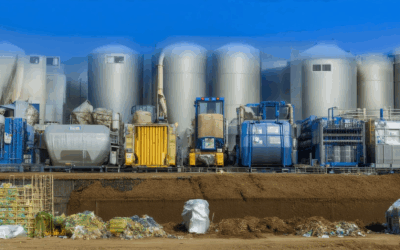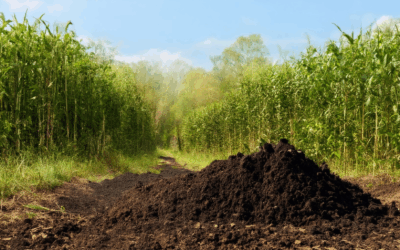In today’s rapidly changing world, the importance of sustainable practices has never been more evident, particularly in agriculture. As populations grow and resources become scarce, adopting low-waste agricultural practices has emerged as a crucial solution to enhance environmental health and ensure food security. These practices not only minimize the waste generated during farming but also promote efficiency and productivity, making them a vital component of modern agricultural strategies. By cutting down on unnecessary waste, low-waste agricultural practices help conserve valuable resources while reducing the environmental footprint of farming operations. From reducing agricultural waste in developing regions like India and Bangladesh to implementing sustainable methods across the globe, these practices demonstrate their potential to transform the way we approach food production. Not only do they benefit the environment, but they also empower farmers to achieve higher yields and better economic outcomes, making them a win-win solution for both ecosystems and economies.
Key Takeaways
– Minimize Chemical Use with integrated pest management (IPM) and organic farming techniques to reduce reliance on harmful pesticides and chemicals.
– Optimize Resource Conservation through crop rotation, mulching, and efficient irrigation systems, reducing waste and preserving natural resources.
– Enhance Soil Health by composting organic waste and implementing cover cropping, which improves soil fertility and reduces degradation.
– Reduce Food Loss with cold storage, controlled atmosphere storage, and improved supply chain management to maintain crop freshness and minimize post-harvest waste.
– Promote Biodiversity through agroforestry and integrated farming practices that support local ecosystems and wildlife.
– Lower Greenhouse Gas Emissions by adopting low-tillage practices, afforestation, and reducing chemical inputs to mitigate climate change.
– Enable Nutrient Cycling by recycling byproducts like manure and farm waste into valuable resources, enhancing long-term soil health.
– Drive Technological Innovation with precision agriculture tools and data analytics to maximize efficiency and minimize waste in farming operations.
– Support Sustainable Livelihoods by fostering education and community engagement in eco-friendly farming methods and land management practices.
– Contribute to a Holistic Future by adopting low-waste agricultural practices that benefit the environment, economy, and society, creating a sustainable legacy for generations.

Low-Waste Agricultural Practices
Low-waste agricultural practices aim to minimize environmental impact while maximizing productivity. These methods focus on optimizing resource use, reducing waste, and enhancing soil health. Here are some key strategies:
- Resource Conservation: Techniques that minimize water, energy, and fertilizer use. This includes drip irrigation, rainwater harvesting, and crop rotation.
- Crop Rotation: Growing different crops sequentially to maintain soil health and reduce the need for synthetic chemicals.
- Composting: Converting organic waste into nutrient-rich amendments to enhance soil fertility and reduce reliance on synthetic fertilizers.
- Cover Cropping: Planting cover crops during off-seasons to protect soil, prevent erosion, and improve biodiversity.
- Precision Agriculture: Using technology to monitor soil conditions and apply inputs only where necessary, reducing waste and improving efficiency.
- Integrated Farming Systems: Combining crops, livestock, and trees to maximize resource use and create a self-sustaining ecosystem.
- Agroforestry: Integrating trees with crops to stabilize soil, reduce erosion, and provide shade, thus lowering the need for additional irrigation.
- Biochar Production: Converting organic waste into biochar, a soil amendment that improves carbon sequestration and reduces the need for chemical additives.
These practices not only reduce waste but also contribute to long-term soil health and sustainable farming systems. By adopting low-waste techniques, farmers can enhance productivity while minimizing their environmental footprint.
How Do Low-Waste Agricultural Practices Reduce Waste and Improve Sustainability?
Low-waste agricultural practices are essential for reducing food waste and promoting environmental sustainability. These methods focus on optimizing resource use, minimizing environmental impact, and ensuring long-term agricultural productivity.
Key Benefits of Low-Waste Agricultural Practices
- Resource Conservation: Techniques like crop rotation, mulching, and intercropping help conserve water, soil, and nutrients, reducing the need for synthetic inputs and minimizing waste.
- Reduction of Chemical Use: By adopting integrated pest management (IPM) systems and organic farming methods, farmers can minimize the use of harmful pesticides and chemicals, thereby reducing waste and contamination.
- Animal Waste Management: Practices such as composting manure and utilizing biogas systems convert animal waste into valuable resources like fertilizer and energy, reducing landfill dependency and waste.
- Water Conservation: Methods like drip irrigation and rainwater harvesting help preserve water resources, reduce overuse, and minimize contamination from excess irrigation water.
- Organic Farming: Embracing organic farming techniques reduces reliance on synthetic fertilizers and pesticides, cutting down on waste generated by non-degradable chemical residues.
- Reducing Food Loss: Implementing cold storage, controlled atmosphere storage, and improved supply chain management helps maintain crop freshness and reduce post-harvest waste.
- Integration of Technology: Precision agriculture tools and data analytics optimize resource use, minimize waste, and enhance sustainability efforts on farms.
By adopting these low-waste agricultural practices, farmers can significantly reduce waste, lower their environmental footprint, and contribute to a more sustainable future. To learn more about sustainable farming techniques and how you can get involved, visit our guide to sustainable farming .

How Low-Waste Agricultural Practices Benefit Farmers and the Environment
Low-waste agricultural practices offer significant advantages for farmers and the environment. These methods not only enhance farm profitability but also contribute to sustainability and ecological health.
Benefits for Farmers
- Reduced Input Costs: By minimizing waste, farmers lower their reliance on costly inputs like fertilizers and pesticides, which often lead to higher production costs.
- Increased Crop Yields: Efficient resource use allows farmers to maximize productivity without over-depleting natural resources, leading to higher yields and better returns on investment.
- Improved Resource Efficiency: Sustainable practices like crop rotation and organic composting ensure that resources are used optimally, reducing waste and enhancing soil fertility.
- Long-Term Soil Health: Healthy soils retain moisture better, reducing the need for irrigation and protecting crops from drought conditions.
Benefits for the Environment
- Soil Health Improvement: Reducing food waste and implementing cover cropping helps replenish soil organic matter, which sequesters carbon and improves soil resilience.
- Water Conservation: Efficient irrigation systems and rainwater harvesting techniques reduce water usage, helping to preserve this vital resource during droughts.
- Carbon Sequestration: Healthy soils act as carbon sinks, mitigating greenhouse gas emissions and contributing to climate change mitigation efforts.
- Biodiversity Support: Diverse farming systems encourage pollinators and beneficial insects, promoting ecosystem balance and supporting wildlife populations.
- Waste Reduction: Lowering food waste through precise planting and harvesting techniques minimizes environmental degradation caused by unsold or discarded produce.
Actionable Tips for Adoption
- Implement crop rotation to maintain soil health and reduce pest infestations.
- Use composting techniques to recycle organic waste back into the soil.
- Adopt precision agriculture tools to monitor and manage resources more efficiently.
- Participate in local markets or value-added opportunities to reduce surplus production.
By embracing low-waste agricultural practices, farmers can enjoy economic benefits while playing a crucial role in preserving the planet for future generations. These practices align with global sustainability goals and demonstrate the importance of environmentally responsible farming methods.

How Do Low-Waste Agricultural Practices Reduce Waste and Improve Sustainability?
Low-waste agricultural practices are essential for reducing food waste and promoting environmental sustainability. These methods focus on optimizing resource use, minimizing environmental impact, and ensuring long-term agricultural productivity.
Key Benefits of Low-Waste Agricultural Practices
- Resource Conservation: Techniques like crop rotation, mulching, and intercropping help conserve water, soil, and nutrients, reducing the need for synthetic inputs and minimizing waste.
- Reduction of Chemical Use: By adopting integrated pest management (IPM) systems and organic farming methods, farmers can minimize the use of harmful pesticides and chemicals, thereby reducing waste and contamination.
- Animal Waste Management: Practices such as composting manure and utilizing biogas systems convert animal waste into valuable resources like fertilizer and energy, reducing landfill dependency and waste.
- Water Conservation: Methods like drip irrigation and rainwater harvesting help preserve water resources, reduce overuse, and minimize contamination from excess irrigation water.
- Organic Farming: Embracing organic farming techniques reduces reliance on synthetic fertilizers and pesticides, cutting down on waste generated by non-degradable chemical residues.
- Reducing Food Loss: Implementing cold storage, controlled atmosphere storage, and improved supply chain management helps maintain crop freshness and reduce post-harvest waste.
- Integration of Technology: Precision agriculture tools and data analytics optimize resource use, minimize waste, and enhance sustainability efforts on farms.
By adopting these low-waste agricultural practices, farmers can significantly reduce waste, lower their environmental footprint, and contribute to a more sustainable future. To learn more about sustainable farming techniques and how you can get involved, visit our guide to sustainable farming .
What Are Low-Waste Agricultural Practices?
Low-waste agricultural practices are sustainable farming methods designed to minimize resource consumption, reduce waste, and protect the environment. These practices focus on optimizing resource use, recycling byproducts, and adopting techniques that promote long-term soil health and biodiversity.
How Do They Help Reduce Waste and Promote Sustainability?
Implementing low-waste agricultural practices leads to several benefits:
- Reducing Food Waste: By minimizing waste during production, transportation, and storage, these practices help in addressing the global issue of food loss and waste.
- Conserving Natural Resources: Techniques like crop rotation, cover cropping, and efficient irrigation systems help preserve water and soil fertility.
- Preserving Biodiversity: Practices such as agroforestry and integrated pest management support local ecosystems and biodiversity.
- Enhancing Soil Health: Methods like composting and organic farming improve soil structure and nutrient content, making soils more resilient to climate changes.
- Mitigating Climate Change: Reduced tillage, afforestation, and reduced chemical inputs lower greenhouse gas emissions and contribute to carbon sequestration.
Examples of Low-Waste Agricultural Practices
Some common examples include:
- Cover Crop Rotation: Placing crops like clover or rye on fallow land protects soil, reduces erosion, and improves fertility.
- Organic Farming: Avoiding synthetic pesticides and fertilizers promotes biodiversity and reduces contamination of water and soil.
- Agroforestry: Integrating trees with crops and livestock enhances soil health, provides shade, and improves air quality.
- Precision Agriculture: Using technology to monitor and manage resources efficiently minimizes waste and maximizes yields.
- Composting: Recycling organic waste into nutrient-rich amendments improves soil and reduces the need for external inputs.
By adopting these practices, farmers can reduce waste, enhance productivity, and contribute to a more sustainable future. To learn more about how you can support and participate in these efforts, visit our website and explore our resources on sustainable living and eco-friendly technologies.

Benefits of Low-Waste Agricultural Practices
Adopting low-waste agricultural practices offers numerous advantages that promote sustainability, profitability, and environmental stewardship. Here are the key benefits:
- Environmental Protection : Minimizes chemical runoff and preserves water resources, protecting ecosystems and wildlife.
- Soil Health : Enhances soil fertility and reduces degradation through techniques like crop rotation and organic amendments.
- Economic Efficiency : Reduces input costs by optimizing resource use and increasing profitability through diverse product streams like biofuels.
- Climate Change Mitigation : Contributes to carbon sequestration and reduces methane emissions from waste, aiding in global warming mitigation.
- Food Security : Decreases post-harvest losses, ensuring stable food supplies and reducing food waste.
- Community Engagement : Promotes education and stewardship, fostering sustainable livelihoods and land management practices.
- Innovation and Policy Support : Drives technological advancements and public policies that encourage widespread adoption of eco-friendly farming methods.
- Nutrient Cycling : Enhances nutrient retention in the soil, reducing reliance on external inputs and promoting long-term soil health.
Conclusion : Low-waste agricultural practices offer a holistic approach to farming that benefits the environment, economy, and society. By adopting these methods, we can create a more sustainable future for generations to come.




0 Comments